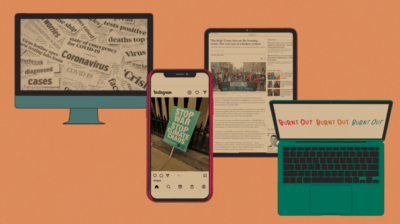How I cope with news anxiety
Waking up to chaos online? You’re not alone. This honest reflection on news anxiety explores how constant exposure to global headlines can fuel stress, and shares practical ways to stay informed without burning out.

Waking up over the last month has been the same: pick up my phone, see the notifications, and feel my stomach churn. I’m an American student studying abroad in Ireland. The five-hour time difference has made it complicated to stay in touch with friends and family back home. It has also added a new layer of stress to each day as I wake up to chaotic and often distressing news from my country.
The moments often blur together: immigration protests in Los Angeles, President Donald Trump’s short-lived attacks on Iran, the Department of Justice’s ousting of my own university’s president; these massive decisions have become commonplace for me. But these changes that affect my daily life and the lives of many of those around me have caused significant stress in consuming news media.
As someone who values being informed, is involved in civics, and aspires to work in the media, it has been difficult to acknowledge this stress. Beyond that, it can feel embarrassing to admit when certain events don’t directly involve me or cause immediate harm to my life because of my identity or the fact that I am not currently in the United States.
Oddly, being away from home has actually made me pay more attention to current events at home as the United States makes decisions that echo throughout the world. These decisions, many of which seem to go against our foundations of government and even just basic humanity, grow harder and harder to digest.
Being informed is something that is important to me. I pride myself on being able to understand the complexities of the United States, where our government is incredibly complicated but also able to endure. Americans are often caricatured abroad as bigoted, and we do occasionally fall into these stereotypes, but in my opinion, one of our best traits is our diversity. To watch that diversity be villainised by incompetent leadership has been painful over the last six months, as chaos has become the new norm with no clear benefit for everyday Americans.
Following, the sense of powerlessness I feel has led me to try to find ways to consume news media more responsibly.
Avoid the comment section
Personally, it can be easy for me to immediately open up the comments section under posts or articles I read. However, this is often where language is the most extreme, and can distort my idea of how people truly feel. Although social media can be used positively, users can misrepresent themselves, express dissent in violent terms, or spread misinformation.
With a complete lack of accountability and the ability to hide behind fake profiles, I’ve personally made the decision to use Op-Eds or published letters if I want a temperature check on how people are reacting to news. These authors might not be “average people”, but they are bound to cite sources and put together arguments that hinge on much more nuance than a comment does, and consistently show more care for their audience.
Be selective with the accounts you follow
A great perk of being a student at my University is getting access to sources like the New York Times or Wall Street Journal for free, which I’ve been sure to take advantage of. Social media also offers lots of other accounts like the Washington Post or New Yorkerwhich have sub-accounts focusing on sections from politics to culture to sports.
Although I love reading snippets of articles that interest me, I find following an excessive number of these accounts becomes overwhelming, particularly as they report breaking news as well as follow-up pieces or op-eds.
As social media platforms like Instagram use algorithms that incorporate feedback loops, engaging with this content through likes, shares, or comments makes it more likely for it to pop up more frequently. These platforms prioritise keeping you online rather than your wellbeing. While staying in the loop is important, if it causes you excessive stress, there is nothing wrong with being selective in what content you engage with.
After consistently engaging with political or news content, I also find it starts to show up in other areas of Instagram or X through Reels or content intended to be entertaining. This can become even more addictive, and slowly, more and more extreme views are included to keep you scrolling.
Incorporate a diversity of viewpoints
Additionally, tracking a diversity of viewpoints on news can also help you avoid extreme content as well as ground the information you digest. Particularly in the US, the media can tend to distort decisions by the government or national developments with extreme language or by misleading the public on what the implications of developments might actually be.
Because our government is so complex and many Americans don’t fully understand it – in all honesty, myself included – hearing exclusively from one standpoint about an issue can be damaging to your understanding and also your emotional state.
Compassion can be an act of resistance
Often, the worst part of news anxiety is the fallout: feeling distressed at news and then feeling even worse because you feel there’s nothing you can do about it. This can be made worse in the US because organising and activism are difficult to do on a broad scale, but outside of that, I’d suggest something that personally helps me, which is being compassionate to those around you.
It sounds cheesy and can feel that way, but I think it’s important not to let the stress of a chaotic world isolate you or lessen your empathy towards others. A sticker in the spunout office serves as an important reminder for me that “compassion is revolution”. Even though we have little control over what happens in our world as young adults, beyond being civically engaged, we shouldn’t forget how important it is to be compassionate.
Even if we feel our leaders are failing at treating others with the respect they deserve, we should continue to hold ourselves to a higher standard rather than feeling doomed by what we can’t control.
Instead of waking up to worry, stress, and a constantly renewed sense of helplessness, making these changes can help you recenter yourself to be a compassionate member of your community. Even if the world around you feels in chaos without a clear path forward, your individual capability for kindness and compassion is more valuable than ever.
Feeling overwhelmed and want to talk to someone?
- Get anonymous support 24/7 with our text message support service
- Connect with a trained volunteer who will listen to you, and help you to move forward feeling better
- Whatsapp us now or free-text SPUNOUT to 50808 to begin.
- Find out more about our text message support service
If you are a customer of the 48 or An Post network or cannot get through using the ‘50808’ short code please text HELLO to 086 1800 280 (standard message rates may apply). Some smaller networks do not support short codes like ‘50808’.






